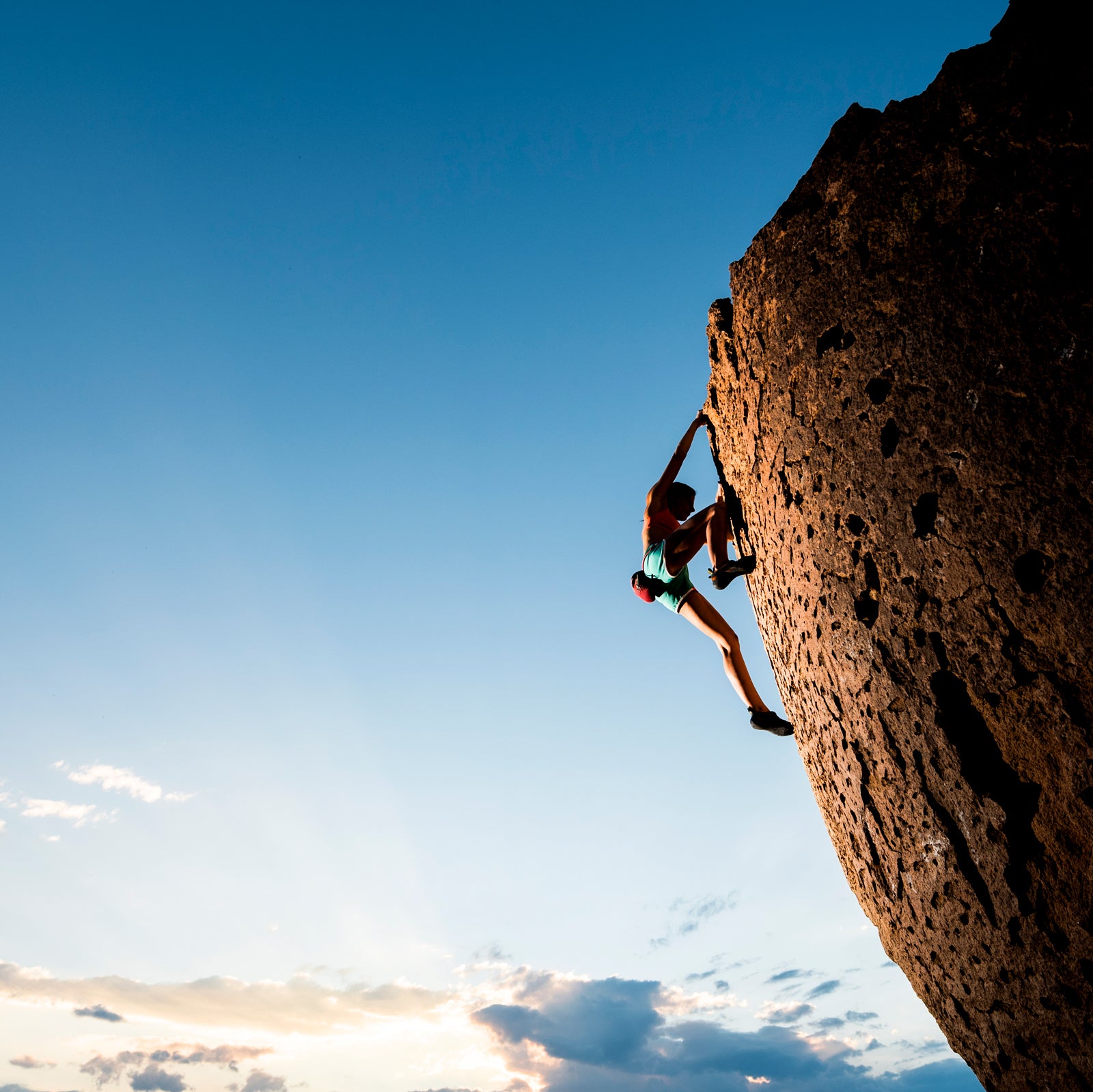For Miriam Pracki, a 36-year-old from Germany, taking up climbing was an essential step in��overcoming years of mental health hurdles. In 2000, when she was a teenager, she developed an��eating disorder. By 2010, she’d been hospitalized three times, and regular patterns of depression and self-harming behavior led her to put her university coursework on hold. But when Pracki, who had always been active and outdoorsy, heard that a new climbing gym was opening nearby, she decided to give it try.
The skills she learned climbing eventually paved the way for her recovery. “While you’re climbing, the only important thing is the now,” she says. “You can’t think about your body weight, or your job, or whatever.” The sport made her feel strong; she recalls with excitement the tension in her core as she completed her first boulder problem on a steep horizontal roof. “That was such a cool feeling,” she says. “Being strong in climbing made me stronger in general. I was able to transfer that success and positivity into everyday life.”��
In the four years following her first trip to the climbing gym, she recovered, returned to a healthy weight, was diagnosed with and treated for ADHD, and finished school. Now��she’s married with kids—her husband is also a climber—and works as an interior designer. She continues to boulder and sport-climb both at the gym and outdoors.��
The sport holds therapeutic promise for many reasons. Climbing can bring about mindfulness, the in-the-moment focus that Pracki experienced, which is key to treating depression, explains Katharina Luttenberger, a psychology researcher at the University of Erlangen��in Germany. It’s also objective—you either top out or you don’t. That makes it harder for those struggling with self-esteem to discredit themselves, as you can’t simply send a route because you were lucky. The sport is loaded with metaphors, too. “A depressed patient needs to find a hold again in life, or you have to climb out of your depression, you have to let go to move on,” says Luttenberger.��
In a movement currently centered in Germany and Austria but gaining traction around the globe, practitioners like Luttenberger are evaluating bouldering psychotherapy—which typically involves a combination of talk therapy and climbing—in controlled studies��and applying it in hospitals and private practices. With a growing body of evidence and support from experts, these psychologists hope to persuade health officials that this therapy is a valuable alternative to more traditional talk-therapy approaches.
Luttenberger and her colleagues have developed a ten-session curriculum over��nearly a decade��of research. Each of the sessions starts with a meditation. Next,��the instructor talks about the theme for the day, such as��self-esteem, trust, or social relationships. The therapist then leads a climbing exercise that illustrates that theme. For example, patients might��boulder blindfolded with the guidance of the instructor or other patients to explore fear, which usually��dissipates once they learn to rely on others’ guidance. The exercise is then followed by a discussion��and another meditation or relaxation exercise.
A paper in BMC Psychiatry found that a climbing-based therapeutic program was a more effective treatment for depression than other exercise regimens that did not involve therapy,��and it was as effective as established methods of talk therapy. The trial followed 240 patients: one-third participated in��bouldering therapy, another third did cognitive behavioral therapy��(a common form of talk therapy), and the final��third initiated��an exercise program at home. The group that��received the climbing treatment improved significantly more than those in the exercise program��and similarly to the group that��received cognitive behavioral therapy. “CBT is powerful and has a long history,” says Luttenberger, who led the study. “And we could show that bouldering therapy was not inferior to CBT, which is great.”��
Creating a control group����without a therapy component��was critical to the study, because exercise, in general, has been shown to have positive effects on mental health.��, conducted in 2012 with 47 participants, found that depression levels dropped significantly among participants who got to boulder, compared to a group placed on a waiting list as a control—but it didn’t prove that bouldering therapy was any better than simply getting your heart rate up and your body moving. The 2020 study expanded the��parameters and made a better case for climbing therapy having real-world potential.��
“The way people approach a boulder problem is very similar to the way people approach life outside of bouldering,” says Lisa Vigg, a psychologist who assisted with Luttenberger’s research and who led her own patients through bouldering-therapy routines in Germany. It reveals behavioral patterns that therapists and patients can then work through in the climbing gym, which serves as a safe place to practice new skills.��
Alexis Konstantin Zajetz, an Austrian psychotherapist, has been exploring climbing therapy since the early 2000s and founded the�� in Salzburg in 2005. A dedicated climber himself, he saw potential in the sport��because of the intense focus it requires and the strong emotions it can bring up, and he began to incorporate bouldering sessions into talk therapy with certain patients. In one session, when Zajetz instructed one of his patients to pick an easy route to climb, she refused to climb below a moderate grade. “She was demanding so much from herself,” says Zajetz, because she was afraid of what others would think if she didn’t climb at a certain difficulty. After that, he was able to work with her on her struggles with self-judgment, both in and out of the gym.��
Compared to other adventure sports, bouldering is relatively approachable and affordable—all you need are��shoes and chalk, and gyms are plentiful these days, with the cost of a day pass usually under $30. Plus, it’s fun and intuitive for many people, adds Zajetz. Even on their first day, most people can complete a route with minimal instruction, bringing a sense of accomplishment, with little time spent refining technique. Advanced and beginner climbers can practice side by side, working on separate routes, making the sport particularly inclusive, says Vigg.
“Anything that gets people who are suffering from depression active physically and socially is a good thing,” Catherine Forneris, a psychiatrist at the University of North Carolina, says��of the research team’s findings. She adds that there are a lot of “unanswered but intriguing questions” about the approach. What the existing��studies��can’t tell us is which��aspect of the therapy is most powerful: Is it the bouldering itself? Is it exercising with a group? Is it the mindfulness lessons? Perhaps all contribute, but for now it’s unclear to what extent the different parts of the program are beneficial.��Forneris adds that future work should seek to replicate the studies with different patient groups outside Germany.
The other goal is to get more widespread recognition.��In January, the first conference on climbing therapy was held in Germany, with about 200 attendees. It featured workshops on��mental conditions��like addiction, depression, anxiety, and PTSD. Pracki also gave a talk on climbing’s role in her recovery. “The participants were so happy to meet other people working with climbing,” says Zajetz.��
In Germany, several clinics and hospitals have climbing walls, so therapists can prescribe a bouldering exercise as part of an intervention. �����ԹϺ��� that setting, however, it’s harder for patients to access bouldering psychotherapy. Zajetz’s patients pay him privately for bouldering sessions. Luttenberger hopes that situation will change in coming years so that bouldering treatments are eventually officially recognized and covered by health care systems. As she points out, it could��be a good alternative for people who may otherwise be wary of the stigma of conventional therapy. In the next few months, she plans to publish a manual for therapists based on the program she’s refined through her research. Zajetz also holds regular trainings at the Institute for Climbing Therapy for instructors and psychologists interested in the approach.��
After leading sessions for Luttenberger’s research, Vigg, who lives in England, says she’s now planning to switch her entire practice to bouldering therapy. “It is so worthwhile to get up from the therapy chair and get active with patients,” she says. “I’ve worked with psychotherapy, both inpatient and outpatient, with groups and individuals, and I would say from experience that��this is the easiest and most joyful way to do therapy for patients and therapists alike.”��


